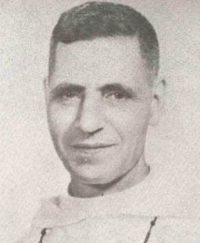Some boys came to school, not knowing that classes had been suspended. The Fathers and the workers went to the seashore in the school bus to get sand with which to barricade the vestibule entrance with sandbags. A van came from Calamba with sacks and more sand from Pasay. It will take us more than a week to cover the windows and doors with about a thousand sacks of sand. We took off our habits and started to work. We were helped by some students and cadets.
By midmorning, we were taken aback by American soldiers installing a big anti-aircraft in front of Letran College. Two of the soldiers, soiled and emaciated, with their rifles hanging, approached me asking for confession. I invited them to the chapel. They knelt without putting down their rifles.
After hearing their confession and giving them communion, I asked them to take a cup of coffee. They said they came from Clark Air Base. The night before and early in the morning, the Japanese raid had caused enormous destruction. They could not tell how many American planes were burned or how many pilots, mechanics and officers were killed. Casualties were heavy on their side. They were scared, but they left Letran physically and spiritually relieved.
Other camps in the outskirts of Manila—Nichols, Murphy, McKinley—have suffered similar destructions. Fires can be seen from all over the city. From our roof, they look imposing. Witnesses inform us that many houses are burning in Baclaran.
In the afternoon, the anti-aircraft gun in front of Letran College was removed, to our great relief. The same thing is happening in other places where pieces of artillery had been installed. The military placed them, removed them. There seems to be widespread confusion in the military organization. Cars, trucks and buses ply about with a seeming lack of direction. The military have begun commandeering vehicles for the transport of military personnel. They pay well for their use or purchase.
The infernal barking of guns continued throughout the night. One could not tell whether they were firing at the planes, at people, at the lights, or at ghosts.
Heaps of bamboo poles were being burned during the night. They were arranged like fans and inverted cones. As they burned, they presented a pictureque and beautiful sight, if one was in the mood to enjoy the spectacle.
We were told that the youth would be called to active duty, especially those who had already been trained in college and those who had complied with military training in cadres. Many want to be reactivated, and they have volunteered. Most of them were told to wait. The country is in danger and the youth are anxious to defend her, but their services are not accepted. Here is an enigmatic irregularity that is hard to explain.
